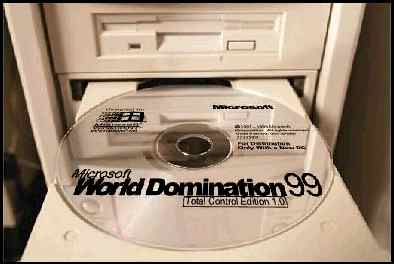What is a systems librarian?
A systems librarian is a person who plans and implements automated systems in the library. A couple of quotes will suffice to support this definition. The first one is from G. K. L. Chan:
"...systems librarians are the people responsible for managing computerised library systems."
The second quote is from S. K. Martin:
"...the people who identify the needs of the library for automated systems, cause these systems to be implemented, and analyze the operations of the library."

Copyright © 2000 Bob Thaves
Where do they work?
Small to medium-sized libraries usually don't have dedicated systems librarians. It tends to be too expensive to employ them or the systems are so small that the libraries don't need them. You will find most systems librarians in places like the National Library of Australia and a number of large university libraries.
What do systems librarians do?
Traditionally, the systems librarian would plan and implement an inflexible and highly specialised all-encompassing solution like a monolithic mainframe system in the library. Now the technology has changed and systems librarians are required to plan and implement a range of flexible and readily-available smaller systems that will serve as building blocks for the library.
Systems librarians are more a manager than an IT officer. They design systems and make decisions that help improve the services to library staff and library users. When it comes to doing the IT work, it is not uncommon for systems librarians to contract the IT work to other people.
What is the planning and implementation process?
The planning process
This involves conducting a research on (i) the current procedures; and (ii) the requirements of the replacement or new system. It means consulting with library staff and providing advice to different interest groups in order to resolve areas of conflict.
The requirements of the new system are then costed and authorization is obtained from higher management to proceed with the project.
This is followed by writing a detailed technical specification paper. This covers the initial research including an awareness of products from vendors which meet the financial constraints.
Finally, the paper is synthesized into a realistic request for proposal (RFP) document; the RFP document is sent to all vendors; and the final system is selected based on responses to the RFP, site visits and demonstrations. (1)

Copyright © 2001 Ted Goff
The implementation process
This involves preparing old systems for data conversion (in liaison with the new system supplier); installing the new system (e.g. organise new furniture, scheduling site preparation by contractors etc); testing the hardware; modifying software and parameters; and documenting the system and training staff to use it.
The tasks you have just seen are called systems duties. If you want to know what takes up the most time, it would have to be consulting with people, writing RFP and training documents and in providing staff training.
Are all systems librarians required to perform these duties?
Participation in planning and implementation is an important part of the job. However, not all systems librarians will be required in all stages of planning for and installing the system or participate to the same degree. Some librarians can be leaders and coordinators, while others were merely members of a team.
Sometimes a systems librarians' work may involve nothing more than writing up documentation and providing staff training and then giving user education. It all depends on the type of library that employs them.
Do they perform non-systems-related duties?
Yes. Most system librarians will also have non-IT duties spanning the whole range of library and information work. Non-IT duties may include:
- information desk or shelving;
- stock selection;
- cataloguing;
- subject responsibility;
- departmental liaison;
- section head responsibility for varying numbers of staff; and
- acquisitions.
Of those systems librarians who do non-IT duties, most will spend up to 10 hours a week on this work. The rest is spent on systems-related duties.
Is life getting easier for the systems librarians?
The duties of a systems librarian are getting more complex. As Michael Schuyler writes in his article Turnkey Systems Solutions:
"Systems design and setup have grown ever more complex as they have segmented from one large, but consistent package into a proliferation of tailor-made solutions - all different, all requiring expert maintenance."
Mark Grosvenor also supports this view by saying:
"...in the past it has been reasonable that a systems librarian maintain in-house library information technology, that is no longer the case given the diversity and complexity of modern hardware and software systems found in most libraries."
The reason for this complexity seems to lie in the way IT has developed in the late 20th and early 21st century.
Traditionally, say in the 1970s, the work of the systems librarian was much simpler and tended to look after a rigid and large-scale library management system. Now that IT has penetrated further into the library, the systems librarian of today is managing a more complex array of smaller standard office automation systems, CD-ROM, PC-based applications, network management, electronic payment systems, and security.
Add to this the fact that more and more systems librarians are having to do some programming on databases, and we can start to understand why they feel life is getting more complex.
How do we simplify the life of a systems librarian?
One way to simplify life for the systems librarian is to introduce a thing called ASPs (Application Service Providers). This is a variation on the outsourcing arrangement whereby much of the training, technology and other technical demands in a library are centralised at another company (i.e. the vendor) and access to the service is provided over the Internet via the vendor's server.
As Norman Kline, president of the US company CASPR, says:
"For the first time, library administrators will have a real opportunity to outsource their hardware, software, and database needs through web application servers. While prices will come down, features and services will increase in quantity and quality through these "new" ASP companies." (2)
For example, library staff are no longer required to purchase outright an application like Microsoft Office. They can now pay a monthly fee and access the application via the Internet direct from the servers of Microsoft. Now if there is a problem with the application, the systems librarian does not have to be busy answering queries from the users. Microsoft can do that instead.
Similarly, a number of libraries can work together to centralise all their catalogue systems onto a single offsite server managed by another company. In that way, there is no duplication of cataloguing work, and the cost to one library to access the catalogue is minimal when shared with many other libraries.

Copyright © 2001 Ted Goff
What is it like being a systems librarian
Compared to other library positions, this is one of the more stressful jobs. In one UK survey conducted in 1994, almost 80 per cent of the 280 responses received from systems librarians said they were under more or much more stress than in a previous job they had prior to taking on the current position.

Copyright © 1979 Bob Thaves
So where is this stress coming from?
The Microsoft monopoly
With an increasing number of small PC-based systems being used throughout the libraries of the world, systems librarians are faced with the unenviable task of having to run Microsoft software. This is an inescapable fact.

Now you may ask, "What's wrong with Microsoft software?" Well, let's look at a few examples.
Systems librarians almost unanimously agree with other IT experts that Microsoft Windows 2000 is riddled with bugs and security flaws as this humorous photograph shows:

And if that's not enough, systems librarians have to contend with numerous Microsoft error messages on a regular basis:




And did we mention how long it takes to load up Microsoft Windows these days? Maybe the Microsoft motto should be, "Windows - how slow do you want to go today?"

When systems librarians have to deal with this kind of problem, it is no wonder they are starting to find the "drag n' drop" feature of Microsoft Windows very useful indeed. Just drag Microsoft Windows 2000 to the top of a cliff, and then drop it.

But let us not stop there. Most of the stress experienced by systems librarians can also be found in the following areas:
- Adjusting to the position for the first time;
- Understanding new systems;
- Promotion to the management position;
- Quantity of work / insufficient staff;
- Responsibility for a wider range of IT applications;
- Lack of time to meet deadlines;
- People; and
- A variety of external factors (e.g. changing organisational environment etc).
Is there any job satisfaction?
Despite the stress, there is the question of job satisfaction. Systems librarians on a whole thought the position was one of the better jobs in the library. According to the UK survey, systems librarians found the position rewarding because it was:
- an intellectual-challenge;
- an opportunity to learn and acquire new skills;
- pioneering;
- the ability to plan well and make important decisions for the library;
- keeping the systems running smoothly; and
- able to give direct benefits to their colleagues and to library users.
In fact, there is a general satisfaction of providing a service to people, more so than the enjoyment that comes from the technical and problem-solving aspects of system management.
How are systems librarians making it easier to do the work?
To make the job less stressful, systems librarians have to be properly trained. Most systems librarians who find the job least stressful are usually computer-trained librarians rather than library-trained computer experts. By having the computer experience and knowledge behind them first, it tends to make it a whole lot easier to apply the computer skills to a library environment.
So don't be surprised if systems librarians learn about computers from a university, and then they learn about the library by doing a diploma in librarianship. This is the common approach to gaining the qualifications and experience.
Another way to make life easier is for the systems librarians to rely on journals for articles relating to computers in the library followed by contacts with other systems librarians and user groups for information and support. When contacts are made externally by systems librarians for systems-related work, these tend to be with system suppliers, followed closely by hardware contractors.
And to make it all worthwhile, it seems most systems librarians enjoy above average salaries compared to the broad spectrum of library and information service professionals. As of 2001, the expected salary range for a fully-fledged systems librarian in Australia is between $55,577 and $59,874.
The future
Will people working as systems librarians be sitting on their backsides more often?!

Systems librarians have to remember they are still librarians. They will not be sitting in front of a computer all the time. They must adapt to new systems as library staff and library users require them. And that means getting up and talking with people, reading journals, and writing reports from anywhere in the world. Because the main purpose of their job is to ensure the best access to information for their clients.
And finally, the job of a systems librarian is stressful, but with a little training, networking with systems experts and friends, and the introduction of intelligent systems, the work should be a rewarding one.
In case you weren't quite deterred after this discussion from becoming a systems librarian, here are a few more trends to keep your mind working overdrive:
RUNNING ON THE OIL OF AN OLD RAG!
Systems librarians are required to choose low-cost systems for the library.
MANAGER vs IT STAFF
Systems librarians will probably be doing more than just managing systems. With financial constraints in place within a number of libraries, they may also be required to install and use the systems to help library staff and the library users.
THE MOVE TO OPEN-SYSTEMS
Systems librarians are embracing open-systems for greater freedom of choice, flexibility, and the ability to move applications from one machine to another. This includes the open-source model where software and the source code is freely available.
GREATER CHOICE OF SYSTEM SUPPLIERS
Systems librarians have a greater choice of system suppliers using the open-system approach.
SOFTWARE-ONLY SOLUTIONS
Systems librarians are looking at software-only open-system solutions including the range of quality database development tools on the market.
RELATIONAL DATABASE MANAGEMENT SYSTEMS
For the least programming efforts and efficient storage and retrieval of data, relational database systems are the preferred systems over conventional types.
GOOD DATABASE DESIGN
A generally neglected area in the world of library management and one which systems librarians are, or will be addressing. It helps to solve the common dreaded user complaint of, "Why doesn't the system do this?"
UNIX-BASED SYSTEMS ARE OPTIONAL
The library community has fully adopted UNIX as the industry standard operating system, mainly due to performance related issues. Now that may change in the future with more flexible, stable, fast and cheaper operating systems (e.g. Windows XP/2000 and MacOSX). But if we keep to UNIX, the industry standard is in the form of POSIX with a version of at least System V.4.
THE INTERNET
With the advent of the Internet, the systems librarian will be looking at new retrieval tools and standards to interrogate the network.
THE NETWORK
The introduction of distributed client-server systems means the systems librarians must look at improving the network to handle the extra information download.